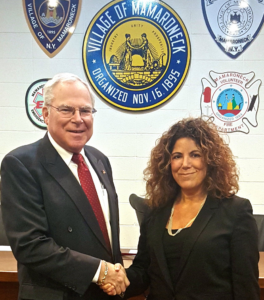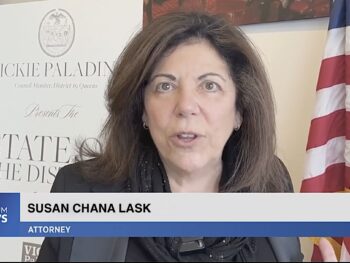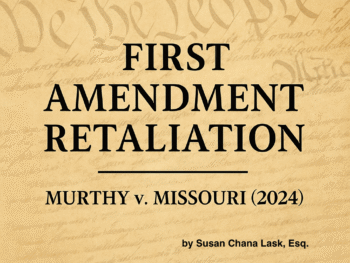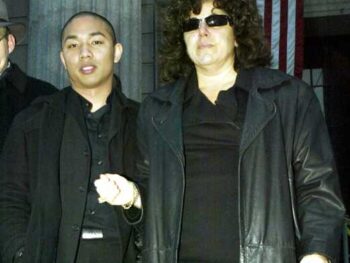

VILLAGE PASSES UNPRECEDENTED DOG LAW WITH SUSAN CHANA LASK
By KILEY STEVENS
Staff Writer 2/26/16
The village of Mamaroneck is the first municipality in the state of New York to ban the sale of commercially bred animals in local pet stores.
This unprecedented law was passed by a 4-0 vote, with one trustee abstaining, at a raucous Feb. 22 Board of Trustees meeting after weeks of discussion and public hearings.
The law, dubbed “Public Local Law D” was proposed by Mayor Norman Rosenblum, a Republican, and passed with the help of Susan Chana Lask, an attorney based in Manhattan. Lask said she became involved with the local legislation when a village resident emailed her asking for help. Although Lask is a litigator, she speaks to towns nationwide about animal protection. “I do that out of passion, pro bono,” she said.
Though Lask and Rosenblum faced opposition from some members of the village board citing concerns over the constitutionality of the mayor’s proposal, Lask told the Review that she has reviewed at least four federal cases that upheld the legality of the law.
“You’re not prohibiting the sale of all animals, you’re just regulating the source,” she said.
The law, as written, states that pet stores within the village may only sell animals that come from animal shelters or humane societies within New York state. Under the law, no animal that comes from a breeder or puppy mill is permissible to be sold in the village of Mamaroneck.
The push for legislation began in August 2015 when residents began protesting a local pet store on Mamaroneck Avenue, then named Best Breeds Puppies and Kittens. The owner of the store at the time, Richard Doyle, of Mahopac, New York, has been in trouble with the law multiple times. He has been charged with three counts of misdemeanor counts of animal cruelty, and one count of selling a diseased animal. One of his store fronts, located in Wappingers Falls, New York, has since closed. In December 2015, he was arrested at one of his other store fronts in Mohegan Lake on two felony counts of witness tampering.
The storefront in Mamaroneck was sold to a new owner in December, Kevin Casiraghi, who renamed the store National Breeders. However, Lask investigated the license number posted on a dog cage in the store, which was connected to a breeder in the midwest who, according to Lask, was laden with violations. Some of the violations included shivering animals, the use of unapproved medications and animals who had not been examined by veterinarians.
When reached by phone on Tuesday, an employee at National Breeders declined to comment.
Part of the problem with regulating the source of animals, according to Lask, is the 120 U.S. Department of Agriculture inspectors that inspect breeders nationwide “do not have the resources to police these puppy mills.” She told the Review that their job is to simply give breeders in violation a notice—not to fine them or shut them down.
Trustee David Finch, a Democrat, expressed concerns that the business model that would come with passage of the law would not be viable for business owners.
Brian Shapiro, the state director of the Humane Society, told the Review in a previous interview that more and more pet stores have been adopting what he referred to as a “humane model,” by sourcing their animals from shelters and humane societies.
Although Finch was concerned about engaging the village in protracted litigation, he did vote for the law. “If I had voted against it, I would be labeled as anti-puppy for the rest of my life,” he said. Finch added that he voted yes partially because Lask agreed to defend the village pro bono should they be hit with a lawsuit in the coming weeks.
Trustee Leon Potok, a Democrat, abstained from the vote out of fear of a potential lawsuit.
Lask told the Review she is very happy that the law passed in spite of the opposition it faced initially. “What we showed is that you shouldn’t cower in the face of adversity, which we had a lot of,” she said.
As for Rosenblum, the vote proved to be a victory he was eager to celebrate. “I could not be prouder to be part of any community, anywhere in the United States…” the mayor said.
An initial proposed law concerning the health care and treatment of pet store animals, proposed in January, is still being discussed by the village board. That conversation will continue at the board’s March 7 meeting after some board members expressed the desire to go over its legislation with the state attorney general.










 NEWS12: LASK GETS LAW PASSED BANNING SALE OF PUPPY MILL DOGS
NEWS12: LASK GETS LAW PASSED BANNING SALE OF PUPPY MILL DOGS